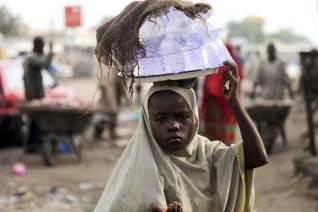Advertisement
From realtor to rescuer: the Nigerian businessman helping Boko Haram victims
MAIDUGURI, Nigeria (Reuters) - When Nigerian businessman Garba Buzu noticed a significant increase in the number of children begging and foraging for food on the streets of Maiduguri, capital of Borno state in northeast Nigeria, he knew he had to act.
Maiduguri has been inundated in the past three years by people fleeing their homes and Boko Haram militants, sending the city's population surging to two million from about 600,000 and putting pressure on housing, health, food, and water supplies.
More than 15,000 people have been killed and 2 million displaced in Nigeria and neighbouring Chad, Niger and Cameroon during the Boko Haram's seven-year insurgency, with Maiduguri in the heart of Boko Haram territory most badly affected.
Buzu, a real estate entrepreneur, said witnessing the plight of these children prompted him to throw open the gates to his 2,000-home estate - even though his philanthropic work in the past has prompted death threats from the Islamist militants.
"They can stay for as long as they need to .. both Muslims and Christians are welcome," Buzu, 77, a Muslim, told the Thomson Reuters Foundation in an interview in his home in the Pompomari area of Maiduguri.
The father of 38 children from four wives, Buzu said people could stay in his property "until Boko Haram finishes", even if that happened after he died.
Buzu's decision to help people has not gone unnoticed - or down well - with the militants whose campaign to set up an Islamic state adhering to strict Sharia law has deep roots in Nigeria's Christian-Muslim divide.
Buzu said he was attacked in 2012 by suspected Boko Haram militants who rode up to his house on motorbikes and fired six shots at him, all of which missed. This was during a spate of high profile Boko Haram-linked assassinations in Maiduguri.
"A number of my friends were assassinated at the time," he said, shrugging off any further possible threats.
VETTED FOR SAFETY
While many of the people arriving in Maiduguri manage to find accommodation with host families, some end up living in camp sites on plots of empty land where thousands of cases of disease and malnutrition have been reported.
There are 22 government-recognised displaced people's camps within Maiduguri, according to local officials.
But others are living in informal settlements on various empty spaces around the city.
Concerned by this situation, Buzu, who owns several property across the city, relocated all the tenants in his Buzu Quarters estate to other estates he owned that were not fully occupied and threw open the doors to people forced from their homes.
Ayuba Muhammed, a leader in the camp who has lived there for two years, said it was not as easy as it sounded to be allowed into Buzu Quarters - as the estate owned by Buzu is now known.
"Nobody can enter just like that," said Muhammed, explaining that everyone there has to first be identified by someone who knows them, to avoid infiltration by Boko Haram insurgents.
"They find someone who knows Garba Buzu and who knows them also, then he will bring them inside and give them a house," he said.
He added that the leaders of the communities from where the people fled are responsible for identifying families before they are allowed to stay.
At present, Buzu Quarters, has 2,000 two-bedroom bungalows and hosts 1,200 households.
Over 300 households in Buzu Quarters are receiving micro-gardening support and 170 households have been selected for income-generation activities under a project funded by the United States Agency for International Development (USAID).
For more than two years, Amina Abubakar, 55, has been living in Buzu Quarters with her husband and 11 children, whose ages range from two to 31.
They arrived in Maiduigiri having fled Damboa, a town about 90 km (55 miles) away, where a member of a civilian joint task force set up to combat the threat of Boko Haram told them about Buzu so they headed to his estate.
"They told us that he usually helps people," she said.
Zara Muhammed, 17, and her family received the same information when they fled Kombi, a village close to Chibok from where the Boko Haram abducted more than 200 schoolgirls two years ago, sparking international outrage.
Muhammed, the youngest of 10 children, has lived in Buzu Quarters with her siblings and mother, a widow, for a year.
"We were with about 10 different families that came here together," she said, adding that they trekked for days before they found motorbikes to transport them to Maiduguri.
"Until we hear that there is security (at home), we will not go back," said Muhammed, the camp leader, terrified by rumours of people being slaughtered after venturing back to their homes in Mafa and Jere local government areas in Borno state.
Buzu said he goes from time-to-time to check on his new lodgers and to find out how they are doing.
"It worries me that they don't have enough food to eat. I wish I could also give all of them food," he said.
(Editing by Belinda Goldsmith)



















Add new comment